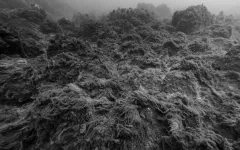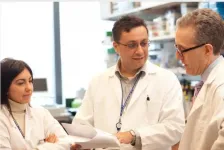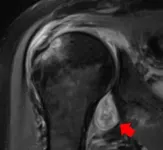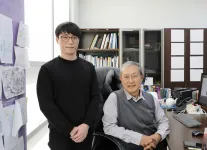Turf wars: Ocean acidification and feedback loops lock in turf algal systems
Researchers from the University of Tsukuba find that in the presence of ocean acidification, feedback loops keep degraded turf algal states stabilized, inhibiting the recruitment of coral and other algae
2021-02-17
(Press-News.org) Tsukuba, Japan - It's tough out there in the sea, as the widespread loss of complex marine communities is testament to. Researchers from Japan have discovered that ocean acidification favors degraded turf algal systems over corals and other algae, thanks to the help of feedback loops.
In a study published this month in Communications Biology, researchers from the University of Tsukuba have revealed that ocean acidification and feedback loops stabilize degraded turf algal systems, limiting the recruitment of coral and other algae.
Oceans are undergoing widespread changes as a result of human activities. These changes take the form of regime shifts - major, sudden and persistent changes in ecosystem structure and function. An example is the replacement of coral reefs and kelp forests with degraded turf algae communities. These shifts result in the loss of not only marine biodiversity, but also ecosystem services, which are of value to humans and contribute to their wellbeing.
"We looked at whether the turf algal state is being maintained by stabilizing feedback loops and hysteresis," says lead author of the study Professor Ben P. Harvey. "We predicted that certain changes in the physical/chemical environment and microbial community may prevent other large algae species from establishing, and function as a feedback loop that supports turf algal persistence."
Feedback loops (control mechanisms in a system) are important in regime shifts because of their ability to both stabilize and de-stabilize states in ecosystems. Hysteresis is the circumstance in which a system has passed a tipping point and moved into a new state, and the original state cannot simply be recovered by reversing the environmental conditions. Instead, the conditions must be reversed past the tipping point. Feedback loops are necessary for hysteresis to occur.
"We found that ocean acidification favors turf algae over corals and other large algae species" says Harvey. "Our results also suggest that hysteresis may be exhibited by this ecological shift - in which case it would be especially difficult to turn around."
This work contributes to an understanding of the processes underlying coastal regime shifts. Knowledge of how marine ecosystems are stabilized by species interactions is needed to mitigate or reverse these shifts, which are predicted to increase as a result of local and global causes. Such work will help to provide for improved science-based adaptive management of these shifts to better conserve coastal ecosystem services.
INFORMATION:
The article, "Feedback mechanisms stabilise degraded turf algal systems at a CO2 seep site," was published in Communications Biology at DOI: END
[Attachments] See images for this press release:

ELSE PRESS RELEASES FROM THIS DATE:
2021-02-17
An estimated 1.1 billion people were living with untreated vision impairment in 2020, but researchers say more than 90 per cent of vision loss could be prevented or treated with existing, highly cost-effective interventions.
Published today in The Lancet Global Health, a new commission report on global eye health calls for eye care to be included in mainstream health services and development policies. It argues that this is essential to achieve the WHO goal of Universal Health Coverage (UHC) and the 2030 United Nations Sustainable Development Goals (SDGs).
Written by 73 leading experts from 25 countries, including University of ...
2021-02-17
FEBRUARY 15, 2021, NEW YORK - A Ludwig Cancer Research study has identified a novel mechanism by which a type of cancer immunotherapy known as CTLA-4 blockade can disable suppressive immune cells to aid the destruction of certain tumors. The tumors in question are relatively less reliant on burning sugar through a biochemical process known as glycolysis.
Researchers led by Taha Merghoub and Jedd Wolchok of the Ludwig Center at Memorial Sloan Kettering Cancer Center (MSK) and former postdoc Roberta Zappasodi--now at Weill Cornell Medicine--have discovered that in a mouse model of glycolysis-deficient tumors, CTLA-4 blockade does ...
2021-02-17
Durham, NC- Can stem cells alleviate lymphedema, a chronic debilitating condition affecting up to one in three women treated for breast cancer? Results of a phase I clinical trial released today in STEM CELLS Translational Medicine (SCTM) show there is a strong possibility that the answer is yes.
Lymphedema is swelling due to a build-up of fluid in lymph nodes - vessels that help rid the body of toxins, waste, and other unwanted materials- usually occurring in an arm or leg. While it can be the result of an inherited condition, its most common cause in the Western world is the removal of or damage to the lymph nodes during the course of cancer ...
2021-02-17
CHICAGO --- Muscle soreness and achy joints are common symptoms among COVID-19 patients. But for some people, symptoms are more severe, long lasting and even bizarre, including rheumatoid arthritis flares, autoimmune myositis or "COVID toes."
A new Northwestern Medicine study has, for the first time, confirmed and illustrated the causes of these symptoms through radiological imaging.
"We've realized that the COVID virus can trigger the body to attack itself in different ways, which may lead to rheumatological issues that require lifelong management," said corresponding author Dr. Swati Deshmukh.
The paper will be published Feb. 17 in the journal Skeletal Radiology. The study is a retrospective review of data from patients who presented to Northwestern Memorial Hospital between ...
2021-02-17
A woman's body shape--not only the amount of fat--is what drives stigma associated with overweight and obesity.
Fat stigma is a socially acceptable form of prejudice that contributes to poor medical outcomes and negatively affects educational and economic opportunities. But a new study has found that not all overweight and obese body shapes are equally stigmatized. Scientists from Arizona State University and Oklahoma State University have shown that women with abdominal fat around their midsection are more stigmatized than those with gluteofemoral fat on the hips, buttocks and thighs. The work will be published on February 17 in Social Psychology and Personality Science.
"Fat stigma is pervasive, painful and results ...
2021-02-17
To provoke more interest and excitement for students and lecturers alike, a professor from Florida Atlantic University's College of Engineering and Computer Science is spicing up the study of complex differential mathematical equations using relevant history of algebra. In a paper published in the Journal of Humanistic Mathematics, Isaac Elishakoff, Ph.D., provides a refreshing perspective and a special "shout out" to Stephen Colbert, comedian and host of CBS's The Late Show with Stephen Colbert. His motivation? Colbert previously referred to mathematical equations as ...
2021-02-17
Children are protected from severe COVID-19 because their innate immune system is quick to attack the virus, a new study has found.
The research led by the Murdoch Children's Research Institute (MCRI) and published in Nature Communications, found that specialised cells in a child's immune system rapidly target the new coronavirus (SARS-CoV-2).
MCRI's Dr Melanie Neeland said the reasons why children have mild COVID-19 disease compared to adults, and the immune mechanisms underpinning this protection, were unknown until this study.
"Children are less likely to become infected with the virus and up to a third are asymptomatic, which is strikingly different to ...
2021-02-17
A new study, published in Bioscience, considers the future of ecology, where technological advancement towards a multidimensional science will continue to fundamentally shift the way we view, explore, and conceptualize the natural world.
The study, co-led by Greg Asner, Director of the Arizona State University Center for Global Discovery and Conservation Science, in collaboration with Auburn University, the Oxford Seascape Ecology Lab, and other partners, demonstrates how the integration of remotely sensed 3D information holds great potential to provide new ecological insights on land and in the oceans.
Scientific research into 3D digital applications in ecology has grown in the last decade. Landscape ...
2021-02-17
With every passing day, human technology becomes more refined and we become slightly better equipped to look deeper into biological processes and molecular and cellular structures, thereby gaining greater understanding of mechanisms underlying diseases such as cancer, Alzheimer's, and others.
Today, nanoimaging, one such cutting-edge technology, is widely used to structurally characterize subcellular components and cellular molecules such as cholesterol and fatty acids. But it is not without its limitations, as Professor Dae Won Moon of Daegu Gyeongbuk Institute of Technology (DGIST), Korea, lead scientist in a recent groundbreaking study advancing the field, explains: "Most advanced nanoimaging techniques use accelerated electron or ion beams ...
2021-02-17
Messenger RNA (mRNA) vaccines to prevent COVID-19 have made headlines around the world recently, but scientists have also been working on mRNA vaccines to treat or prevent other diseases, including some forms of cancer. Now, researchers reporting in ACS' Nano Letters have developed a hydrogel that, when injected into mice with melanoma, slowly released RNA nanovaccines that shrank tumors and kept them from metastasizing.
Cancer immunotherapy vaccines work similarly to mRNA vaccines for COVID-19, except they activate the immune system to attack tumors instead of a virus. These vaccines contain mRNA that encodes proteins made specifically by tumor cells. When the mRNA enters antigen-presenting cells, they begin making the tumor protein and displaying it on their surfaces, ...
LAST 30 PRESS RELEASES:
[Press-News.org] Turf wars: Ocean acidification and feedback loops lock in turf algal systems
Researchers from the University of Tsukuba find that in the presence of ocean acidification, feedback loops keep degraded turf algal states stabilized, inhibiting the recruitment of coral and other algae







